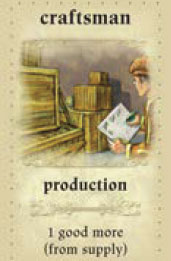The Settler

The player who chooses this role may take either a quarry tile as his privilege or one of the face-up plantation tiles and place it on any empty island space on his player board. Afterwards, each other player, in clockwise order, may take one of the face-up plantation tiles (not a quarry tile! - exception: construction hut) and place it on any empty island space on his player board.
Finally, the settler player puts the untaken plantation tiles face-up on a plantation discard stack and draws new plantation cards from the facedown stacks, placing them face-up next to the quarry stack. He draws one more than the number of players.
Notes: Remember the special functions of the hacienda, construction hut, and hospice. If there are not enough plantation tiles left in the face-down stacks, the player first draws and places those. He shuffles the discarded plantation tiles face-down, creates a new face down stack, and fills the face-up row. If there are insufficient tiles to refill the face-up row, players in following rounds may have to do without.
Where a player places quarry and plantation tiles on his island plays no role in the game. The tiles may not be removed from the island. If a player has filled all 12 island spaces on his player board, he may not place plantation or quarry tiles in future settler phases. If there are no more quarry tiles in the quarry tile stack, the settler may not use his privilege and the owners of a construction hut may not use that special function.
The Mayor

The tiles (plantation, quarry, or building) have 1 to 3 circles. A player may place one colonist on each circle on the tiles on his player board. If there is at least one colonist on a tile, it is considered occupied. Only occupied tiles may use their functions; unoccupied tiles never function.
The player who chooses this role may first take one colonist from the colonist supply (not fromthe colonist ship!) as his privilege. Next, the players take the colonists from the colonist ship one at a time, starting with the mayor. The players continue to take one colonist at a time, in clockwise order, until none remain on the colonist ship.
A player may place his new colonist(s), together with all the colonists he acquired from earlier rounds, on any empty circles on the tiles on his player board. Thus, a player may move a colonist placed on a circle or San Juan in an earlier round. If a player cannot place all his colonists, he may "store" them on the small city of San Juan on his player board. The colonists remain there until a later mayor phase when they may be placed on empty circles on the player's tiles.
As his last duty, the mayor puts new colonists on the colonist ship to be used in the next mayor phase. For each empty circle on the buildings on the player boards of all players (empty circles on plantations and quarries do not count!), the mayor takes one colonist from the colonist supply and places it on the colonist ship. However, as a minimum, the mayor should always place at least as many colonists on the ship as there are players in the game.
Notes: Usually, all players place/move their colonists at the same time. If, however, the players feel that their placement decisions may depend on other's placements, the players should place their colonists is the following order: first, the mayor and, then, the others in clockwise order from the mayor.
If a mayor forgets (players may remind him) to place new colonists on the colonist ship, players later place the minimum (number of players) on the colonist ship. When the colonist supply runs out, the mayor may not use his privilege and, of course, he does not refill the colonist ship.
No player may choose to place colonists in San Juan if he has empty circles available on his player board. All empty circles must be filled, if possible. Colonists may not be placed on the circles other than in the mayor phase.
The Builder

The player who chooses this role, can immediately build one building for one doubloon less than the normal cost as his privilege. He pays the money to the bank, takes the building from the supply, and places it on any empty space in the city on his player board.
When placing a large building, the player needs two adjacent empty spaces. Then, the other players, in clockwise order from the builder, may, in the same way, each builds one building (at normal cost).
Note: No player may build more than one building per round. Further information on the individual buildings is at the end of the rules.
Quarry
Each occupied quarry that a player owns may reduce the player's cost for building a building by 1 doubloon. The limit for such reductions is shown on the game board: players building buildings in the first column can reduce their cost by at most 1 doubloon (1 occupied quarry), in the second column by at most 2 doubloons (2 occupied quarries), in the third column by at most 3 doubloons (3 occupied quarries), and in the fourth column by at most 4 doubloons (4 occupied quarries).
The mayor's privilege reduction is in addition to the quarry reduction, but the cost of a building may not be reduced below 0 doubloons. A player with 3 occupied quarries pays the following costs: construction hut: 1 doubloon; office: 3 doubloons; harbor: 5 doubloons; city hall: 7 doubloons.
Notes: Remember the special function of the university. If the builder does not build a building, he does not take 1 doubloon for his privilege. It is not possible to build on more than 12 city spaces. A player who has no empty city spaces may not build more buildings.

The Craftsman
The player who chooses this role, takes goods from the supply according to his production ability and places them on the windrose on his player board. Thus, the windrose contains a player's money and goods. Next, the other players take goods from the supply according to their abilities, in clockwise order from the craftsman.
Notes: Remember the special function of the factory. If the kind of goods a player produces is exhausted in the supply, he goes without. If the craftsman does not produce goods, he does not get an extra good (privilege).
The Trader

The player who chooses this role, may immediately sell one good to the trading house. He takes from the bank the price associated with the good he sold (0 - 4 doubloons) plus 1 doubloon as his privilege. Then, in clockwise order from the trader, each other player may sell one good to the trading house for the price shown as long as there is room for it in the trading house. The trader phase ends when all players have had one turn to sell or when the trading house is full.
When selling, use the following rules:
The trading house has room for just four goods. When it is full, no other players may sell goods in this trading phase.
The trading house buys only different kinds of goods (exception: office). As his last duty, the trader empties the trading house if it is full with four goods, placing them in their separate supply piles. If there are fewer than four goods in the trading house, they remain there. It will be more difficult to sell goods in the next trader phase, because of the kinds of goods already there and the fewer number of spaces available.
Notes: Remember the special functions of the small and large markets and the office. If the trader does not sell, he does not collect the extra doubloon (privilege). A player may sell corn to the trading house even though he earns no money for doing so.
The Captain

The captain is in charge of shipping goods to the old world. This means that the captain is the first to load goods on the cargo ships. Then, the other players follow, in clockwise order from the captain.
Note: in the captain phase, each player may get several turns to load goods on the cargo ships. When it is a player's turn to load goods on a cargo ship, he must load if he can.
However, a player may load goods of only one kind on a turn. The captain phase continues, clockwise around the table, as long as at least one player has goods he can load.
Continue Reading

